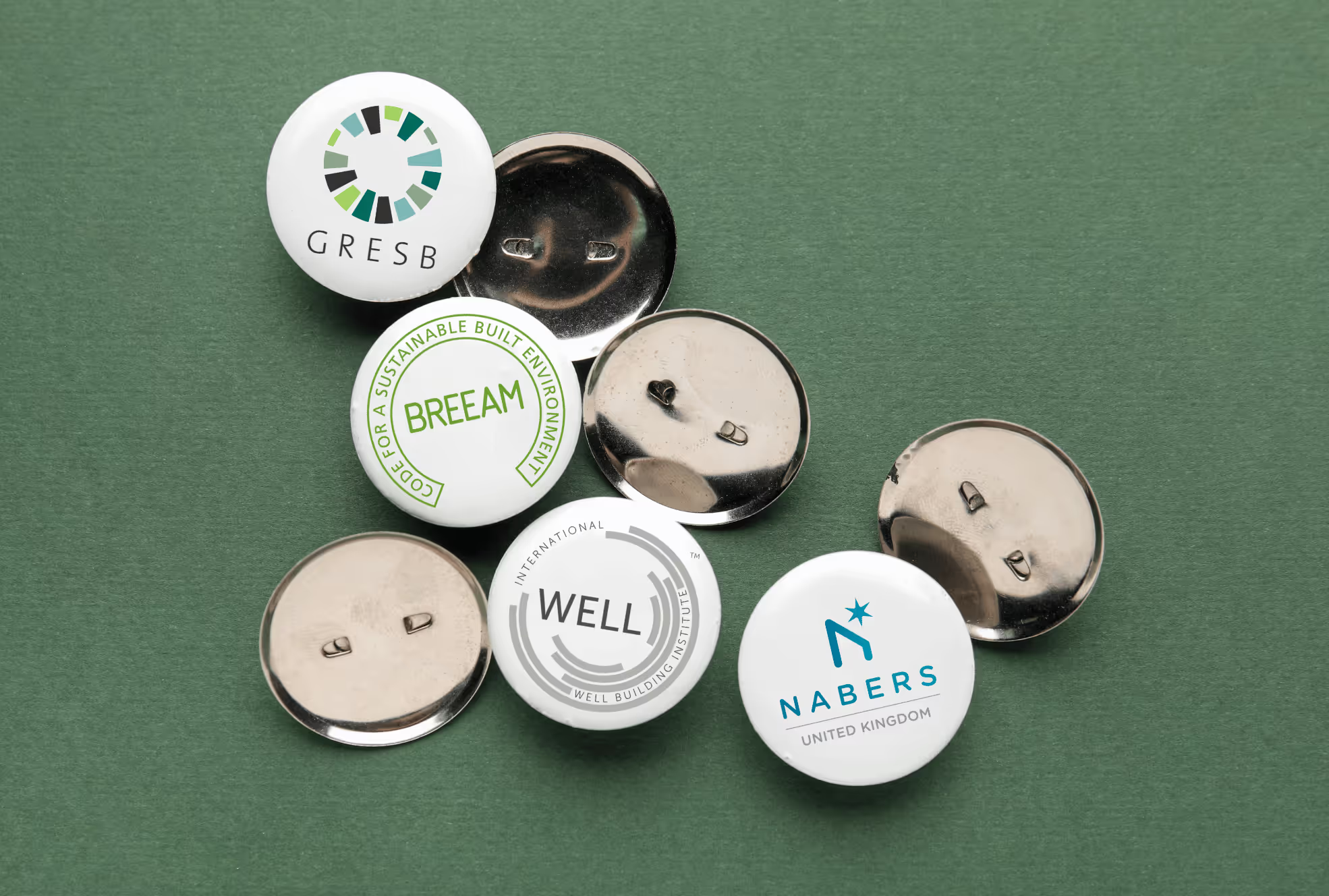With the constantly evolving importance of ESG in real estate, accreditations and certifications can provide owners and operators with a useful benchmark to ensure ESG strategies are delivering, and targets are achieved.
But much like the PropTech market, the ESG related accreditation scene is noisy. And with many requiring a lot of in-house heavy lifting or sometimes substantial financial investment, it can be hard to know where to start.
We’ve rounded up the key Real Estate ESG accreditations to help cut through the noise. Want support to know which way to go or interested in having your asset pre-certified for a number of these certifications? Get in touch.

AirScore by AirRated
AirScore by AirRated is a global standard for indoor air quality (IAQ) using sensor technology which is graded to give an Air Score for each property. The certification measures humidity, temperature, CO2, particulates (PM10 and PM2.5) and Volatile Organic Compounds (VOC’s). AirRated also have AirScore D&O for RIBA stages 0-5.

BREEAM (Building Research Establishment Environmental Assessment Method)
Since 1990, BREEAM’s global standards have encouraged a more sustainable built environment by assessing an assets performance at every stage, from design through to construction. Created by Building Research Establishment (BRE), a research-based group which aims to raise standards in the built environment, BREEAM assessments evaluate; energy and water use, management processes and resilience, transport, use of resources, health and wellbeing, land use and ecology, pollution, materials, waste and innovation. The process is led by a trained assessor, who gathers evidence of best practice.
BREEAM In Use
BREEAM In Use is an independently assessed certification for existing buildings, enabling property investors, owners, managers and occupiers to determine and drive sustainable improvements in the operational performance of their assets. Areas covered are as BREEAM (as above) and can also be used as a benchmark. BREEAM In Use is also led by an assessor.
BREEAM Infrastructure (formally CEEQUAL)
Also delivered by BRE, BREEAM Infrastructure is a sustainability assessment, rating and awards scheme for civil engineering, infrastructure, landscaping and public realm projects.

CyclingScore
CyclingScore rates commercial real estate according to a set of standards that promote cycling as a primary mode of transport. Assessments look at facility quality, infrastructure and readiness, including services such as onsite show facilities and well-lit bike parking. The certification aligns to other benchmarks such as BREEAM, LEED and WELL.

Fitwel
Fitwel have a vision for a healthier future where all buildings and communities are enhanced to strengthen health and well-being. Created in 2017 by the U.S. Centers for Disease Control and Prevention (CDC) and the General Services Administration (GSA), the certification is generated by expert analysis of 7,000+ academic research studies. Fitwel is designed to help building owners and operators improve the health and well-being of occupants through design, construction, and operational strategies. Fitwel can provide opportunities for increased GRESB scoring.

Global Real Estate Sustainability Benchmark (GRESB)
GRESB is designed to provide actionable ESG data and benchmarks for financial markets across all aspects of ESG for real estate.
A management component assesses strategy and leadership, as well as processes, risk management and stakeholder engagement, whilst performance and development components look at the asset level ESG data and include topics such as energy consumption, greenhouse gas emissions and tenant and community engagement.
The benchmark is aligned with international financial reporting frameworks, including the DJSI (Dow Jones Sustainability Indices) and TCFD (Task Force on Climate Related Disclosures), as well as goals set out by the Paris Climate Agreement, and the UN’s Sustainable Development Goals.

ISO 14001
ISO 14001 an international standard that helps organisations improve their environmental performance through more efficient use of resources and reduction of waste, gaining a competitive advantage and the trust of stakeholders.
Rather than establishing performance requirements like many other accreditations, ISO 14001 provides a framework for an effective environmental management system (EMS) enabling an organisation to identify, manage, monitor and control their environmental issues in a “holistic” manner.

LEED (Leadership in Energy and Environmental Design)
Developed in the US in 1998 by the US Green Building Council, the LEED certification scheme followed in the footsteps of UK based BREEAM. The certification is points-based and projects earns points by adhering to prerequisites and credits that address carbon, energy, water, waste, transportation, materials, health and indoor environmental quality. Criteria for the assessment is 60-70% similar to BREEAM.

Minimum Energy Efficiency Scheme
MEES was introduced by the government in 2018 to improve the quality and increase the energy efficiency of the worst performing non-domestic and privately rented residential buildings.
MEES regulations (minimum E rating) changed with effect from April 2023 to include all leases, not just new ones, resulting in an any existing lettings with an F or G rating being deemed “unlawful” with fines likely to apply. In 2027 a minimum C rating, and in 2030 a minimum B rating will become statutory requirements, as outlined in the Energy White Paper in December 2020. Properties over 1,000m2 need a compliant ‘action plan’ detailing the energy efficiency of the property for sales or lettings.
An Energy Performance Certificate sets out the energy efficiency rating of a property with recommendations on improving its energy efficiency. Any property which has been marketed or let since 2008 requires an EPC which lasts for 10 years with certain exceptions.

NABERS UK
Launched in November 2020, NABERS UK is an adaptation of the rating programme NABERS that has operated in Australia since 1999. Providing a rating from one to six stars for offices, NABERS UK helps building owners understand their building’s performance versus other similar buildings, providing a benchmark for progress.
There are currently two products available in the UK for office buildings: NABERS Design for Performance drives energy-efficient new builds, and NABERS Energy for Offices measures how energy-efficient existing assets are. Unlike design-based energy ratings, NABERS UK measures and rates the actual energy use of offices, helping building owners to accurately track and communicate the energy performance of their buildings. It also helps identify areas for savings and improvements.

WELL Building Standard
Created by the International WELL Building Institute (IWBI) in 2014, WELL assesses buildings according to their impact on the health and wellbeing of building users. The WELL standard is anchored by a library of over 500 evidence-based, design, policy and operational strategies that, when implemented, can improve the health and well-being of building users.
Due to LEED and WELL having the same certification body, Green Business Certification Inc (GBCI), certifications can be pursued together as part of the same process. WELL provides opportunities for increased GRESB scoring.

WiredScore
WiredScore assesses and certifies digital connectivity and smart technology in offices on a global scale. This can help landlords assess, improve, benchmark and promote their buildings based on how tech-ready they are. Whilst not directly linked to ESG, the part technology and connectivity play in the collection of data to underpin ESG strategies and outcomes means this certification deserves a place on the list.
What next?
Here at Trustek we are WiredScore and SmartScore APs, and we can provide pre-certification benchmarks for many of the above via our Building Audits. Want to talk to us about what accreditations might be best for your business? Get in touch with us here.









-2.jpg)
.jpg)



